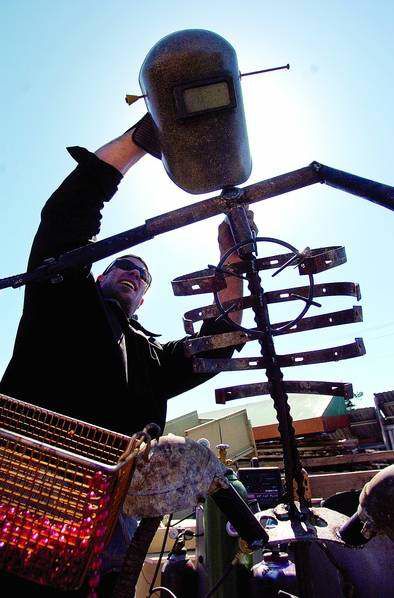Turning trash into treasure
Published 5:00 am Monday, April 24, 2006

- Hunter Dahlberg, a member of Team Heavy Metal Thunder, tests where to place the head in a sculpture. Dahlberg was one of more than 30 artists who took items found at Pakit Liquidators and turned them into works of art Sunday.
Early Sunday morning, Ken Sweetman picked up a potato ricer lying among the piles of what a less-trained eye would call junk at Pakit Liquidators, and inspiration struck.
By midafternoon, Sweetman’s vision of a pelican was coming to life, one recycled item at a time.
The belly was two bike helmets glued together; the neck a spigot; the legs, wings and tail made out of shelf brackets. And the face and beak were a potato ricer with a long, white handle.
Sweetman was among about 30 artists who were at Pakit Liqui- dators Sunday for the annual art event Trashformations, where local artists turn the trash they find at Pakit Liquidators into art.
”This is fun,” said Sweetman, who is mostly a painter.
The event, in honor of Earth Month, is held around Earth Day each year. The creations then go on display in different locations throughout Bend. This year, the work will be in the Old Mill District from Wednesday to Sunday. An artist reception will be held from 5 to 8 p.m. on Thursday.
”The concept is to find junk and turn it into something that people think is valuable and that is art in support of Earth Month and recycling,” said Sweet Pea Cole, who helped organize the event with Pakit Liquidators owner Pat Korish. ”The focus is on found objects.”
Cole said each year they ask artists to come to the one-day event, where 99 percent of the items in the artwork comes from Pakit Liquidators, a business that will buy and sell almost anything.
”We take whatever needs to find a new home,” Korish said.
And artists used almost anything as they worked to create art – dog dishes, old cake pans, scrap metal, plastic water pitchers, picture frames and an old pair of manacles.
In its sixth year, the art event has been held on days where there has been ”snow, rain and hail,” Cole said.
”Which takes a lot of the joy out of it,” she said.
But on Sunday, artists and those who came to see the artists work were treated to a beautiful blue sky.
One of the draws of Trashformations, Cole said, is taking artists out of their usual medium and having them collaborate with other artists.
”We try to pull people into different spheres from where they show and work,” Cole said. ”Artists work next to artists. When you’re in your studio, you’re alone.”
Near Cole was a group of artists in blue overalls working as a team. Known as the Junk Monkeys, the artists debated on how to decorate a chair they had made from a stool, old wooden ironing board, a dresser and rusty nails.
The women – Tara Doherty, Geneva Bahrke, Lloyd McMullen and Louise Montgomery – said the hope is to create something that is easy to transport.
”Every year it is lighter and lighter, but it is never easy to move,” Montgomery said.
The group started working at around 6:30 a.m. and began with a pew, which was later discarded.
”You always think you need a lot more than you really do,” Montgomery said.
Korish said the idea for Trashformations partly came from the cable television show ”Junkyard Wars.” In each episode of the show, contestants were given a set time limit to build objects out of what they could find in a junkyard.
The TV show thrives on high pressure with contestants competing against each other. On Sunday, as people strolled by watching the artists work, Korish said, Trashformations takes a different approach. No winners are announced or prizes given.
”This is mellow. People are helping each other. It’s a fun day,” he said. ”It’s just, come and see what you can build.” With his brother and sister, Korish was working on a piece that used blocks of old redwood decking to build a globe. Continents were shaped with wiring and dotted with random objects – a cigarette lighter, springs, can openers, kangaroos, a toy Snoopy, a wristwatch and broken glass. Hoses that usually connect to sinks swooped across the globe, a commentary on the world’s dependence on oil.
The artwork, Korish said, is intended to spur the question of who will refill the Earth’s vending machine when the resources are gone. It is a message that coincides with Earth Day.
”We treat the Earth like a vending machine,” Korish said.






